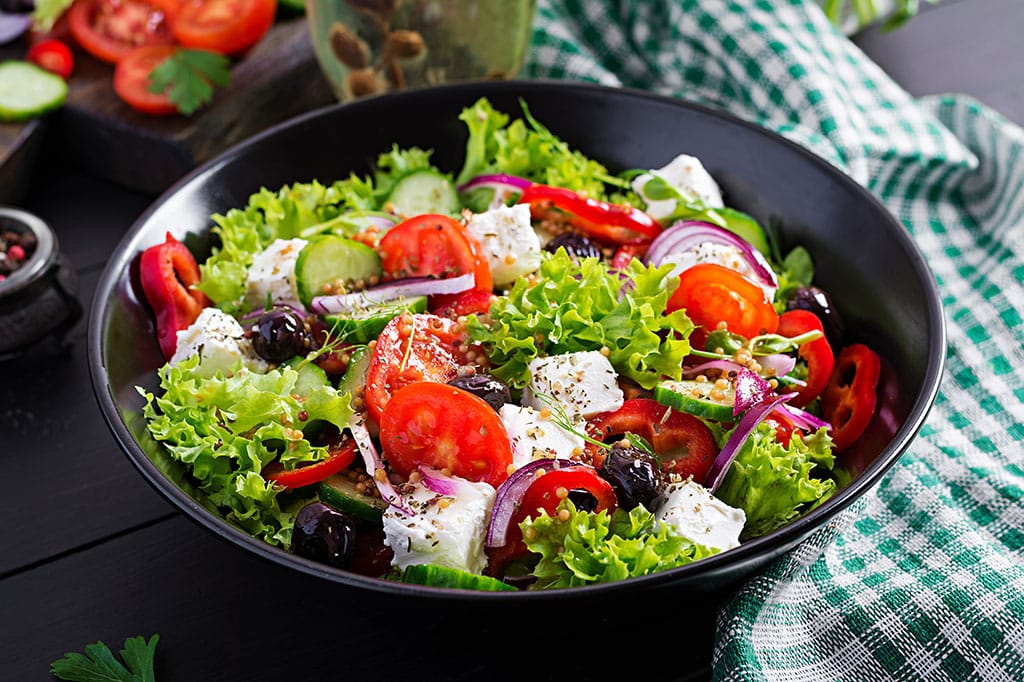Time for a culinary adventure through the wonderful world of authentic Greek food. Picture yourself under the Mediterranean sun, surrounded by landscapes that hold stories of history and delicious flavors. Greece, with its unique location and fascinating evolution, has beautifully woven together ingredients, traditions, and cooking methods to create a food culture that's simply captivating.
Imagine plump olives, sun-kissed tomatoes, fragrant herbs, and fresh seafood, all courtesy of a climate that’s truly exceptional. These elements form the very foundation of Greek cuisine, offering a taste experience like no other.
What makes Greek food so special is its power to take you on a journey through time. It’s like a flavorful passage through the heart of Greek heritage and traditions, where diverse influences and centuries of culinary wisdom come together to create a feast for your senses. Join us as we explore the not-so-philosophical part of Greek culture.
Greek cuisine is a delightful blend of flavors and aromas, thanks to its exceptional ingredients. With Mediterranean roots, Greek culinary traditions revolve around using fresh, local, and high-quality components. In this exploration, we’ll uncover the essential elements that define Greek cooking and make it a delicious and wholesome experience.
From the bustling markets of Athens to the quaint villages of the Greek islands, each region brings its own unique twist to the table, reflecting local traditions and influences.

One simply cannot talk about Greek cuisine without mentioning olive oil, often referred to as the “liquid gold” of Greece. The country boasts a perfect Mediterranean climate for olive cultivation, and its olive oils are known for their exceptional quality and taste. Extra virgin olive oil, made from cold-pressed, ripe olives, is the cornerstone of Greek cooking. It adds a distinctive, fruity, and slightly peppery note to dishes, enhancing both flavor and texture. Whether drizzled over a fresh Greek salad, used in cooking, or as a dipping sauce for warm, crusty bread, olive oil is an essential and cherished ingredient in Greek kitchens.
Greek cuisine thrives on the use of fresh, seasonal, and locally-sourced produce. Ingredients like tomatoes, cucumbers, bell peppers, and onions, as well as herbs like oregano, mint, and basil, are staples in the Greek diet. They form the foundation for dishes like the famous Greek salad, a delightful combination of ripe tomatoes, crunchy cucumbers, zesty red onions, and salty feta cheese, all brought together with a drizzle of olive oil and a sprinkle of oregano. This commitment to freshness not only ensures vibrant flavors but also aligns with a healthy Mediterranean diet that’s long been celebrated for its health benefits.
With a coastline that stretches for thousands of kilometers, it’s no surprise that Greece has a profound love for seafood. Greek cuisine commonly features fresh fish, octopus, squid, and mussels. Grilled whole fish, seasoned with just a pinch of salt, a dash of olive oil, and a sprinkle of herbs, is a testament to the “less is more” approach in Greek cooking. Seafood lovers are in for a treat when exploring Greek cuisine as they savor succulent flavors straight from the azure waters of the Mediterranean and Aegean Seas.



Greek cuisine also takes advantage of the country’s diverse flora. It gives rise to exceptional honey and an abundance of nuts. Honey, often produced from thyme or wildflowers, is renowned for its rich, aromatic, and slightly earthy taste. It’s used in various desserts, especially the beloved baklava, a sweet and sticky pastry filled with nuts and honey. Speaking of nuts, walnuts, almonds, and pistachios are commonly incorporated into Greek pastries, creating a delightful contrast between crunchy nuts and sweet, gooey honey.
Feta cheese is perhaps the most famous and beloved Greek cheese, known for its crumbly texture and salty taste. It’s used extensively in Greek cooking, adding richness and depth to a wide range of dishes. From the iconic Greek salad to spanakopita, a savory spinach and feta pastry, this cheese is cherished for its versatility and bold flavor. It’s a staple in Greek homes, and the quality of feta cheese can greatly influence the success of a dish.
Greek cuisine isn’t overwhelmed with spice. It relies heavily on the use of aromatic herbs and some select spices like cinnamon, cloves, and bay leaves. Fresh herbs like oregano, rosemary, and mint, often sourced from Greek mountainsides, add a distinct and delightful fragrance to dishes. Their use enhances the natural flavors of ingredients without overpowering them.

Greek gastronomy is a journey of flavors, deeply rooted in a rich culinary tradition that dates back centuries. It’s more than just food; it’s a way of life. In this chapter, we will unveil the essential elements of Greek cuisine and the philosophy that makes it unique.
What defines Greek cuisine is its dedication to fresh and uncomplicated ingredients, allowing their natural flavors to shine. Whether it’s the ripest tomatoes, fragrant herbs, or luscious olives, the emphasis is on quality. The culinary techniques, grilling and baking, capture centuries of Greek tradition. Grilled dishes like souvlaki, seasoned with herbs and olive oil, have a distinct smoky taste. Meanwhile, baking is used in both savory and sweet creations, from spanakopita to baklava.
A vital aspect of Greek cooking is its commitment to seasonality and sustainability. Ingredients are celebrated at their peak, aligning with the Greek agricultural calendar. This practice not only guarantees the best flavors but also demonstrates an eco-conscious approach. It’s a philosophy that has passed down through the generations, emphasizing the importance of traditional values.
Greek cuisine is intrinsically connected to the Mediterranean diet, renowned worldwide for its health benefits. The diet emphasizes fresh produce, olive oil, whole grains, and lean proteins, with ingredients like tomatoes and garlic playing significant roles. Experts widely recognize this diet for its potential to reduce the risk of chronic diseases.
Beyond the ingredients and cooking techniques, Greek gastronomy encapsulates a profound philosophy. It encourages savoring every morsel, cherishing the pleasure of dining with companions, and recognizing the cultural and historical significance of each dish. Greek meals embrace life and the connections made around the table as unhurried celebrations.
In conclusion, Greek food is a tribute to tradition, purity, and the goodness of its ingredients. It’s a way of life that promotes unity, good health, and the joy of savoring every bite. Greek cuisine isn’t solely about food; it’s a reflection of a culture that has embraced the art of dining for centuries, and its flavors are an open invitation to partake in this ageless tradition.

Beyond the mouthwatering flavors, Greek culinary traditions contain history and a vibrant culture. Whether you opt for dining at Greek restaurants or going on a culinary adventure in the comfort of your own home, we encourage you to relish not just the food itself, but the very essence of Greece. It’s a journey that promises to be a source of joy, cultural enrichment, and a profound admiration for the culinary wonders of Greece.
Join us here at European Food Express as we come together to celebrate the magic of authentic Greek cuisine! We proudly offer the tastes and traditions that have charmed generations.
Copyright © 2024 by EuroFoodExpress.com. All rights reserved.